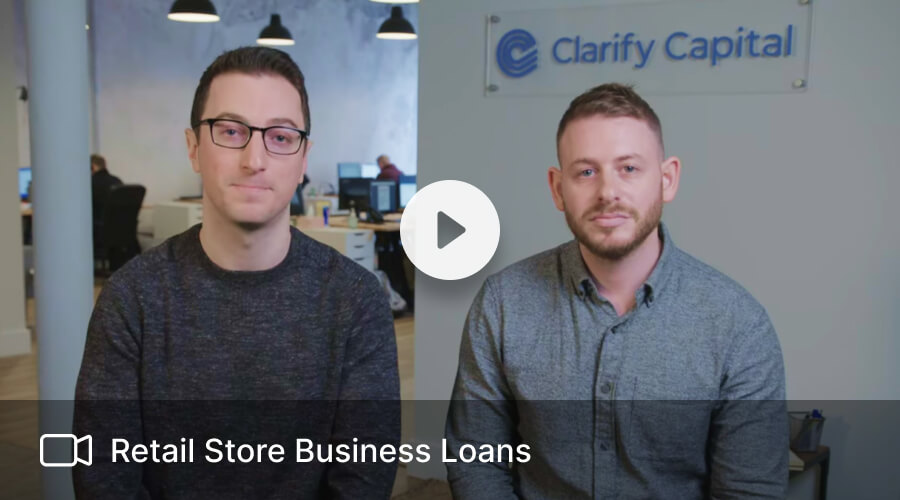Top 5 Financing Options for Retail Business Owners
Owning a business in the retail market comes with cash flow challenges that can affect your growth strategy. Having easy access to working capital is key to maximizing your growth potential.
1. Business Line of Credit for Retailers
If your market segment has seasonal trends that create gaps in cash flow, a business line of credit is usually the best funding option. With a business line of credit, you get approved by a lender for a fixed amount of credit (similar to a credit card).
Retailers also use credit lines to fund upgrades like new POS systems, an essential tool for improving checkout speed and managing inventory.
The biggest advantage of having a credit line is that you only pay interest on funds you withdraw. It's a good hybrid between a traditional term loan and a business credit card.
Best suited for: Retail businesses that need money for occasional expenses like renovations, stocking up on inventory, and hiring short-term staff to handle seasonal demand.
At a glance, a business line of credit features:
Interest rates starting as low as 5% on Clarify's marketplace
On-demand working capital anytime you need it
Funding within 24 to 48 hours with minimal paperwork
Only pay interest on funds used, with no fixed costs
No prepayment penalties
Improves your personal credit score
2. Short-Term Loans for Retailers
When you're in a crunch to meet payroll or pay for unanticipated expenses, term loans are the fastest funding option. Since unsecured term loans require no collateral, you can quickly get money in your bank account with minimal paperwork.
A key advantage of short-term loans is that most retailers can get approved, even with a lower credit score, and access funds in as little as 24 hours with a fixed rate. The speed at which term loan applications get approved makes it the preferred choice for small business owners needing to meet urgent demands.
Best suited for: Retail businesses that need flexible financing with payment terms tailored to their cash flow. Term lengths range between six months and two years.
Features of short-term loans include:
Fast approval and funding
No collateral needed
Six- to 24-month term length
APRs starting at 6% on Clarify's marketplace
Interest paid on the principal loan amount is tax-deductible
3. Equipment Financing for Retailers
Equipment purchases can range from a computer and point-of-sale (POS) software to restaurant kitchen appliances. An equipment financing loan can pay for 100% of the cost up front and break the expenses down into manageable monthly payments.
Retailers are increasingly investing in POS software and back-office systems to stay competitive. Equipment loans make these upgrades affordable.
The core benefit is the ability to borrow up to 100% value of the equipment, which makes investing in new equipment possible with minimal paperwork. Since the equipment you're buying serves as collateral, you can get approved even with bad credit.
Best suited for: Purchasing equipment needed for your business, regardless of your personal credit score.
Equipment loans feature:
Finance up to 100% of equipment costs
APRs as low as 6% on Clarify's marketplace
Fast approval and funding within one to two days
Simple, monthly payment terms
Low documentation requirements
4. Inventory Financing for Retailers
Inventory is the lifeline of every retailer. Whether you're a bar owner needing to stock up on wines or an electronics store scaling up inventory for the holiday season, having adequate inventory to meet customer demands is essential for business success.
With holiday sales, back-to-school rushes, and spring restocks, large up-front inventory buys are often mandatory. Inventory financing helps bridge that gap.
Similar to an equipment loan, inventory financing is a self-secured funding option that allows you to buy goods without the need for extra collateral. Alternative lenders are usually the best option, as traditional banks and credit unions typically only approve large, established wholesalers and retailers. Clarify's lending marketplace makes the process easy.
Best suited for: Product-based business owners looking to supplement inventory before a seasonal sales spike.
Here are some key features of inventory financing:
No collateral needed; inventory acts as collateral
Low credit score eligibility requirements
Funded within 24 to 48 hours
Monthly payment terms
APRs starting as low as 6%
5. SBA 7(a) Loans for Retailers
SBA loans are the best option if you have patience, good credit, a business plan, consistent annual revenue, and an established business history to qualify. The U.S. Small Business Administration (SBA) backs up to 85% of your loan amount through its approved lending institutions. The downside to SBA 7(a) loans is the strict financial requirements and lengthy paperwork needed.
While SBA loans offer some of the lowest interest rates, they typically require 30–90 days for approval, which may not suit businesses needing faster capital.
Best suited for: Retailers with an excellent credit history, established time in business, and no urgent need for funding.
Here's what you can expect with an SBA 7(a) loan:
Excellent credit score needed
Partially backed by the SBA
Interest rates as low as 5.75%
Long repayment term lengths
Low down payments
How To Use Retail Loans
As a retail business owner, your cash flow can fluctuate depending on inventory needs, seasonal trends, market shifts, and the national economic outlook. This makes having access to working capital critical to success. A business line of credit or term loan can help bridge gaps caused by unpredictable events.
Bridge Gaps in Seasonal Trends
Better manage cash flow during seasonal demands with a working capital loan. You'll have access to funds when you need them the most to bridge demand gaps.
Purchase More Inventory
During high-demand seasons, it's critical to have extra inventory to maximize your sales potential. Funding from Clarify makes it easy.
Open New Locations
With retail financing, you can lease or buy a great location for your store. You shouldn't have to compromise on a location due to costs. We've got you covered!
Improve In-Store and Online Experience
Upgrade your physical storefront or enhance your e-commerce platform to boost sales and customer engagement. From remodeling displays to investing in digital POS systems, Clarify's funding options support modern retail growth.
Compete With E-Commerce Giants
In order to compete with online giants like Amazon, independent retailers are getting smarter with their funding. Business financing gives smaller shops the agility to compete in ways that don't require massive infrastructure or warehousing.
Here's how retail businesses are leveling the playing field:
Upgrading point-of-sale systems to speed up checkout and sync inventory across in-store and online sales
Expanding product lines quickly by financing bulk inventory orders ahead of peak seasons
Investing in digital marketing and local SEO to reach new customers in their own neighborhoods
Offering flexible payment options like Buy Now, Pay Later (BNPL), funded by short-term working capital loans
With fast, no-collateral financing from Clarify Capital, retail businesses can stay nimble, meet customer expectations, and scale strategically, even in a hyper-competitive space.


